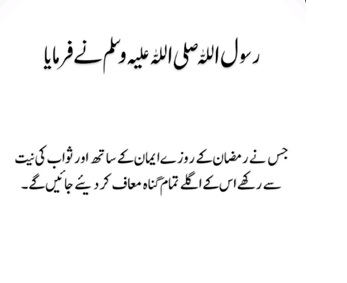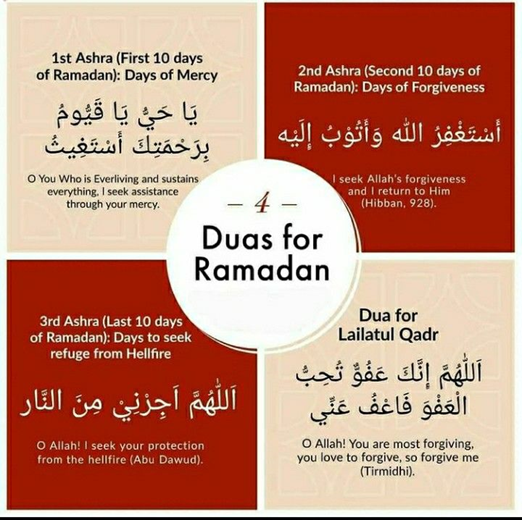Ramadan Karim is the 9th month of the Islamic Calendar. It is the holiest month in Islam. Muslims all over the world observe fasting (abstain from food, drinks and sex) from dawn to sunset. Ramadan was made fardh (obligatory) in Sha’ban in the 2nd year after Muslims migrated from the city of Makkah to Madina. Allah (S.W.T) showers his blessings on those who fast in the month of Ramadan and pardon their sins. Besides the spiritual benefits of the Ramadan Kareem, there are physical as well as medical benefits of Ramadan. Spiritually, it cleanses our soul and physically it cleanses our body unless someone indulges in Iftar.
Muslims stops eating before fajr prayers (pre-dawn). The last meal they can have before dawn is called Sehri and then break their fast at sunset which is called Iftar.
Moreover, observing Ramadan needs careful preparations so that to get the benefits of this holy month. Here we will discuss what preparation needs to be done before reaching the month of Ramadan as well as what activities (prayers, duas, wazaif) to be performed during the month of Ramadan. Moreover, we will also be discussing the spiritual as well as physical benefits of the holy month of Ramadan. The Prophet Muhammad (Peace be upon him) and his companions (Shabah) used to prepare ahead of Ramadan, like they would fast in the month of Sha’baan which is a Sunnah of the Holy Prophet to fast on the 15th of Sha’baan. Prophet Muhammad also used to increase his ibadaah (prayers) during the month of Ramadan. The following is Dua of Prophet Muhammad
“O Allah, bless us in Rajab and Sha’baan and allow us to reach Ramadan”
Spiritual Benefits of fasting in Ramadan:
- The month of Ramadan provides an opportunity to increase our deeds of worship the Allah (S.W.T) in terms of recitation of the Holy Quran, offering the obligatory prayers, as well as supererogatory prayers (Nawafil) and also to do dhikr. The Ajar form Allah (S.W.T) for these prayers increase many folds in Ramadan.
- Allaw (S.W.T) pardons the sins of a Muslims if they repent with sincere tauba. in this holy month.
- The holy month of Ramadan also gives us an opportunity for self-reflection; it is not just to abstain from food and drinks but also about spiritual growth and reflection. Its lesson is to observe Sabr (patience) which is a life-long lesson for a believing Muslim.
- We must also participate in charity, to look after the downtrodden folks in our neighborhood as well as our relatives. Provide them with food, provide them with means to buy food for themselves and their children. It is a great lesson for Muslims to feed the and get highest rewards from the Lord Almighty Allah (S.W.T).
- We should also strive for self-improvement in the month of Ramadan. Look into our lives to identify areas that need improvement. Adopt good habits and do away with bad habits like telling lies, back biting, swearing or cursing, etc.
- We must make a sincere effort in this month to better our self, reform and discipline our lives, for the ultimate betterment and reward in the afterlife.
Physical/Medical benefits of fasting in Ramadan:
- Improve insulin sensitivity: Fasting in Ramadan reduces the risk of type 2 Diabetes. Because, fasting can improve insulin sensitivity and lower blood glucose levels.
- Weigh loss: Fasting can also help in weight loss. Because it lowers body fat and generally improve overall health as well as lower the risk of other obesity related illness.
- Detoxification: Fasting helps in detoxifying the body and eliminate toxins which ultimately improves overall health.
- Improves immune functions: Fasting can improve the immune system which can help in fighting of infectious diseases.
Besides the above spiritual and physical benefits, Fasting has a lot of benefits which cannot be summed up in one single article. The ultimate goal of fasting in Ramadan is to praise Allah the Almighty and invoke his blessings in this month and in our whole life in general. We can do that by asking His forgiveness, through our prayers, Dhikr and Adhkar, and by doing good deeds. We need to look into the life of our beloved Prophet Muhammad to learn how he spent his days and nights in the month of Ramadan. He used to reduce his sleep at night and minimized instead he would spend his nights in prayers. That is the whole purpose of the Ramadan. We also need to replicate his teachings and do as our beloved Prophet Muhammad did. Coming up, we will discuss the righteous deeds that we can do in Ramadan as well as Prayers, Duas and Wazaif that needs to be performed in the month of Ramadan.

Prayers, Duas, Dhikr & Adhkar during Ramadan:
- Obligatory Prayers: The five (05) obligatory (fardh) prayers must be performed on its specified time. In Ramadan the reward of obligatory prayers increases manifolds.
The Prophet Muhammad (S.A.W) said: “A great and blessed month has cast a shadow on you …and whoever performs an obligatory act of worship in it, he will be like a person who performed 70 obligatory acts of worship in other times…”
- Taraweeh Salah (Night time) Prayers: The wife (Bibi Aysha) of Prophet Muhammad (May peace and blessings of Allah be upon him) narrated that the Prophet used to pray (at night) in Ramadan and he used to extend his prayers. Therefore, we must take our time to perform the night time prayers (Taraweeh) to get the maximum benefit and Ajar from Allah (S.W.T).
- Tahajjud Salah (Prayers): During Ramadan, offering Tahajjud Prayers becomes a bit easier because one has to wake up for Sehri. Therefore, a couple of Rakah Salat e Tahajjud can be offered. Reward of offering Tahajjud Prayers during Ramadan is unimaginable. Allah says that these are the blessed hours, whoever ask whatever will be granted.
- Nafal Salah (prayers): Nafal Salah (prayers)/Supererogatory prayers be offered regularly as Salat e Tauba, Salat e Hajjat, as well as Tahayatul Wuddu.
- Dhikr & Adhkar: Musnoon duas (Wazaif), Dhikr & Adhkar to please our Lord Allah (S.W.T) during Ramadan increase its effectiveness manifolds. The following are duas to be recited in the first, second, and third ten days (Asharas) of the holy month of Ramadan:
Dua during first, second, and third Ashra of Ramadan and Layla tul Qadr:

- Recitation of Quran: Allah (S.W.T) grants special rewards and blessings during Ramadan to those who regularly recites the Holy Quran.
- Astaghfar: We must do tauba for our sins in the month of Ramadan and do Astaghfar in abundance because Astaghfar opens the gates of relief and happiness. The Prophet Muhammad Said: “I swear by Allah that I seek Allah’s Pardon and turn to Him in repentance more than seventy times a day.”
- Good & righteous deeds: Good and righteous deeds ajar increases in Ramadan. We need to stop and refrain from telling lies, fighting, refraining from back biting, cursing, abusing, time wasting rather we must spend our time during Ramadan with good deeds, like charities, helping someone carry their load, help our parents, help our spouses in their work, offer food to the needy and hungry. Besides, we must adopt good manners. As mentioned by Imam Ibn Taymiyyah that: “Deen itself is manners. Anyone surpassing you in manners is better than you in Deen”.
Therefore, we must strive to improve our manners, get rid of bad habits and adopt good ones in the month of Ramadan and strictly adhere to them the rest of our life.
- Observance of Laylatul Qadr: The night of Qadr is one of the blessed nights in the last 10 days of Ramadan. A number of hadith highlights the significance of this night. It is advised to look for Laylatul Qadr in the odd days of the last ten days. Saying of the Holy Prophet Muhammad (S.A.W) is that : “Whoever prays on Laylatul Qadr out of faith and sincerity, shall have all their past sins forgiven,” .
Besides, significance of this blessed night “Laylatul Qadr” is mentioned in the Quran as: “The Night of Decree is better than a thousand months”.
Another hadith mentions that: “Search for the Night of Qadr in the odd nights of the last ten days of Ramadan”.
- Itekaaf: The last ten (10) days of Ramadan are spent in seclusion, i.e “Itekaaf” It is a ritual retreat from day to day life, speaking, etc. Moreover, its reward is mentioned as if someone observes Itekaf in the last ten days of Ramadan is equivalent to the performance of two Hajj and two Umrahs.
Above, we have mentioned few guidelines, which needs to be observed during the blessed month of Ramadan to achieve the maximum benefits and rewards promised to all Muslims by Allah (S.W.T) and his beloved Prophet Muhammad (may Allah be pleased with him). Moreover, we must also increase our ibadaah during the rest of the days, months following the month of Ramadan. As this month is training for a believing Muslim for how to actually spend our lives, in worshiping Allah and observe his commands and refrain from what he has forbade us to do. May Allah make this holy month of Ramadan a special one, and may He forgive all our sins. A’ameen.